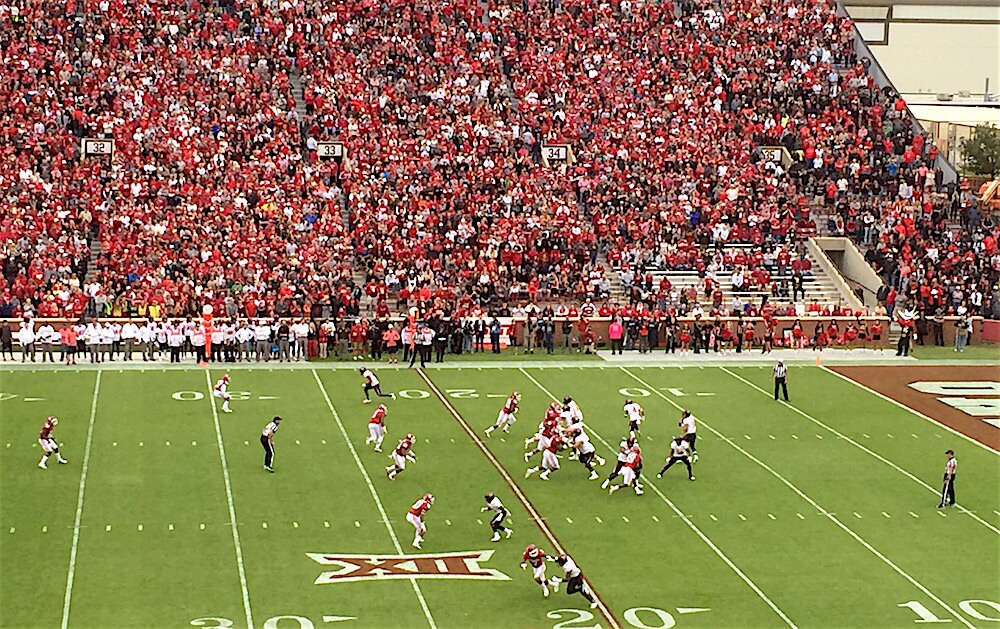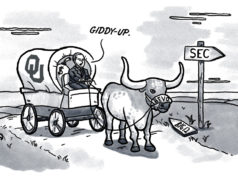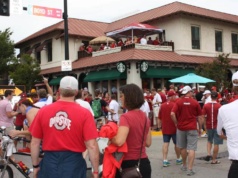

The OU Sooners make their inaugural college football playoff appearance today at 3 p.m. central time, and a fair number of 9 to 5ers are annoyed about it.
“Who schedules a game for 3 p.m. on Thursday?” multiple people have asked me this week, as if I somehow have an answer.
But while many employed folks have called in sick to work, taken PTO or made excuses to run office errands late this afternoon, I look at this timing conundrum as a symbol of a bigger problem: Americans are working too long in the office.
Americans work more than anyone in the industrialized world.
More than the English, more than the French, way more than the Germans or Norwegians. Even, recently, more than the Japanese.
And Americans take less vacation, work longer days, and retire later, too.
That much most people agree on. What’s harder to pin down is exactly how much Americans are working.
That ABC News article features many interesting comments, but I don’t need Bureau of Labor statistics to prove the point I’m making.
Instead, I’d like to highlight the words of Aldous Huxley, who opened his 1936 essay, Time and the Machine, with this observation:
Time, as we know it, is a very recent invention. The modern time-sense is hardly older than the United States. It is a by-product of industrialism – a sort of psychological analogue of synthetic perfumes and aniline dyes.
Back when my paycheck was tied to a cubicle, I came across Huxley’s profound essay one day while “running out the clock,” a phrase I use to describe Forced Sitting after all work has been accomplished but before quitting time has arrived.
Like many of my peers, I pondered Forced Sitting as a modern, middle-class malaise — the winter sun having set by the time I left work each day. I have wondered why technology allows office workers to be more productive than ever, but yet people remain tethered to antiquated 40-hour work weeks based on manufacturing goals and consumption hours.
Huxley, though, lived closer to when the idea of “time” changed. One of the first Western men to experiment with the drug mescaline, Huxley discussed its high in his book, The Doors of Perception. When asked by a doctor how his initial dose affected his perception of time, the author said: “There seems to be plenty of it.”
For anyone tied to a typical 9-to-5 office job, that’s rarely the case. Work expands to fit the time available for it, the old adage goes. In modern offices, time ticks by while workers grow tired and less productive as the afternoon progresses. If the working public is just waiting for it to become “nearly 5 o’clock,” many can work at whatever pace they choose. They cannot leave early, after all. They can only stay late.
In Time and the Machine, Huxley discussed how our modern concept of time derived from industrialization. He spoke of its pernicious effects 80 years ago:
Time is our tyrant. We are chronically aware of the moving minute hand, even of the moving second hand. We have to be. There are trains to be caught, clocks to be punched, tasks to be done in specified periods, records to be broken by fractions of a second, machines that set the pace and have to be kept up with. Our consciousness of the smallest units of time is now acute. To us, for example, the moment 8:17 A.M. means something — something very important, if it happens to be the starting time of our daily train. To our ancestors, such an odd eccentric instant was without significance — did not even exist. In inventing the locomotive, Watt and Stevenson were part inventors of time.
Indeed, our distant ancestors didn’t fret over being five minutes late anywhere. They worked, perhaps, from sun up to sun down depending upon occupation, but they did not watch a clock to consider their progress. That difference from modernity is something Huxley noted as an observer of many Eastern cultures that had not adopted Western schedules in his time:
Our awareness of time has reached such a pitch of intensity that we suffer acutely whenever our travels take us into some corner of the world where people are not interested in minutes and seconds. The unpunctuality of the Orient, for example, is appalling to those who come freshly from a land of fixed meal-times and regular train services. For a modern American or Englishman, waiting is a psychological torture. An Indian accepts the blank hours with resignation, even with satisfaction. He has not lost the fine art of doing nothing. Our notion of time as a collection of minutes, each of which must be filled with some business or amusement, is wholly alien to the Oriental, just as it was wholly alien to the Greek. For the man who lives in a pre-industrial world, time moves at a slow and easy pace; he does not care about each minute, for the good reason that he has not been made conscious of the existence of minutes.
Hardly possible in modern America for a worker desperately waiting to bolt the office at 5 p.m., right? And certainly, any Sooner fan waiting for this Orange Bowl to start is calculating just how much time he or she has to find a TV.
This brings us to a seeming paradox. Acutely aware of the smallest constituent particles of time — of time, as measured by clock-work and train arrivals and the revolutions of machines — industrialized man has to a great extent lost the old awareness of time in its larger divisions. The time of which we have knowledge is artificial, machine-made time. Of natural, cosmic time, as it is measured out by sun and moon, we are for the most part almost wholly unconscious. Pre-industrial people know time in its daily, monthly and seasonal rhythms. They are aware of sunrise, noon and sunset, of the full moon and the new; of equinox and solstice; of spring and summer, autumn and winter. All the old religions, including Catholic Christianity, have insisted on this daily and seasonal rhythm. Pre-industrial man was never allowed to forget the majestic movement of cosmic time.
Cosmic time is hard to enjoy when “quitting time” creeps into the early evening, and Huxley knew it. The conundrum is painful: Work may be over, but the day will be too by the time you change your damn pants.
Industrialism and urbanism have changed all this. One can live and work in a town without being aware of the daily march of the sun across the sky; without ever seeing the moon and stars. Broadway and Piccadilly are our Milky Way; our constellations are outlined in neon tubes. Even changes of season affect the townsman very little. He is the inhabitant of an artificial universe that is, to a great extent, walled off from the world of nature. Outside the walls, time is cosmic and moves with the motion of sun and stars. Within, it is an affair of revolving wheels and is measured in seconds and minutes — at its longest, in eight-hour days and six-day weeks. We have a new consciousness; but it has been purchased at the expense of the old consciousness.
What would Huxley think of America now? My God, I cannot fathom, as we are walled off from the world of nature more than ever. Email, the Internet and computers might blow the author’s mind, but they would not change the thesis he laid out in prose. In fact, modern technology might well bolster it.
More efficient, same hours
Why must modern office workers put in the same hours they and their predecessors did in the 1950s or ’60s? In those days, secretaries might work an entire shift to produce and mail written correspondence with five, 10 or 15 people. Now, a dozen emails can be read and replied to over one cup of coffee.
But while technology has made us all more capable and more productive, the rat race may have sped up equally. It seems nearly impossible to feel connected with cosmic time when workers must manage some vague concept of taking “time off” to watch a big football game, or even spend time with their kids. While some may wonder why legions of Americans report being unhappy, I suggest we look no further than the time structures in our lives.
Time for friendship and fellowship matters. Hard work should be efficient and effective. Adults are not school children who must remain in their seats until the bell rings.
So here’s hoping the bosses of all OU football fans are a little lenient this afternoon.
The progeny of pre-industrial people want to watch a game of sport.





















